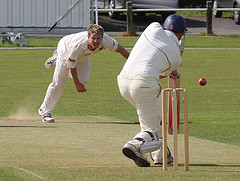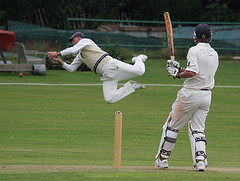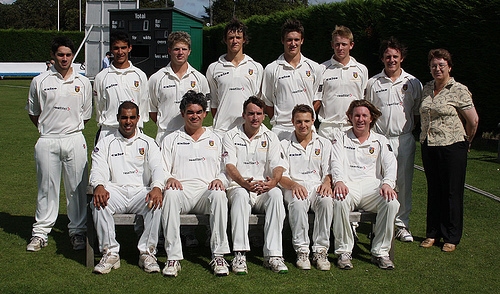Old Malvernians 178 (Nash 70, Watkinson 4-14, Meaker 2-35) beat Old Cranleighans 152 (Waters 68) by 26 runs
The dream of winning the Cricketer Cup in only our second year in the competition ended in the final at Old Deer Park as we lost to Old Malvernians by 26 runs. Nevertheless, we played superbly for three-quarters of the match and it was only in the dying overs that Malvern’s experience proved too much. They were the worthy winners but the youth of our side means that we should be a force to come for a number of years.
Malvern had a superb record in the competition, with five wins from five finals. Like us, they also made the final in their second year, although they went one better than we eventually managed.
Henry Watkinson won the toss and opted to field, hardly a surprise given that we had successfully chased in all four rounds. The pitch was dry and produced variable bounce, and Malvern found runs hard to come by. Stuart Meaker bowled a fiery opening spell, in contrast to Watkinson who relied on guile and accuracy and who took the first wicket in the sixth over, bowling Powell.
Watkinson’s opening spell of 5-2-4-1 set the benchmark, and Meaker got his reward four overs later when Mark Hardinges, who seven days earlier had steered Gloucestershire to a one-day win over Hampshire, dragged into his stumps for 2. Gifford looked capable of posing problems before he played an ugly cross-batted shot to Seren Waters, and at 31 for 3 in the 15th over, our tails were up.
Middlesex’s David Nash was clearly the danger man, and he found gaps with the skill expected of a professional, and with Franklin, the opener, he rebuilt the innings. Franklin should have been run-out with the score on 56 but Michael Chetwode fumbled a return to the bowler’s end with the batsman stranded mid pitch. However, we struck a crucial blow with the last delivery before lunch when Franklin tamely cut Matt Crump to Phil Roper at backward point for 29. We headed off in the better position, with Malvern 86 for 4 off 30 overs.
Nash and Usher batted well after the break, taking the total to 153 for 4 with judicious placement more than out-and-out aggression. In the innings overall there were only ten fours. In the final overs the batsmen hit out and, inevitably, wickets fell.
Nash perished for 70 to a tumbling catch from Roper and in the next over, the 46th, Meaker bowled Usher for 30. Watkinson then chipped in with two in two, and a brace of run-outs in the final over restricted Malvern to 178. Watkinson finished with excellent figures of 8-3-14-4 and the last six wickets had gone for 25 in five-and-a-bit overs.
The pitch continued to throw up puffs of dust and the outfield was slow, so it was a gettable target but not an easy one. The early sunshine had also given way to low cloud and the temperature had dropped into the 50s. 
Waters top-edged the first ball he faced, a bouncer, over the keeper for four, and was struck by the second. But he showed composure beyond his years and was soon looking as assured as ever. Howard fell early, getting a leading edge, but that brought in Matt Crump, another young player in great touch.
Early shackles were broken when Waters twice lofted fours over midwicket, and Crump then joined in, surviving a half chance when he hammered the ball to the right of square leg who could only parry the ball.
Crump perished for 17 – one of three leg-befores against batsmen going back – and then Malvern’s seasoned spinners really tightened their grip on the game, backed by some excellent fielding. Abeed Janmohamed, such a class act in the semi-final, struggled to find his touch, but Waters kept things ticking along. Janmohamed departed for a 27-ball 3 (69 for 3) but Meaker sought to impose himself from the off.
The penultimate over before tea appeared to have swung the balance of the match, 15 coming off it including the day’s first six, a swing over long leg from Meaker. We headed off on 102 for 3 off 30, needing 77 to win in 20 overs with wickets in hand.
Whatever was served for tea, it perked up Malvern and pretty much did for us. Meaker fell lbw to the first ball after the restart and the pressure was on. James Halton, who specialises in run chases, looked up for it, but wasn’t able to stay long enough to make a difference.
Waters, who passed his fifty before tea, found it almost impossible to get enough of the strike. Eds Copleston was unable to push the ones needed to keep Waters at the striker’s end, although he did strike one sublime straight six.
The run-rate, which had hovered around four an over throughout, began to rise as the gloom worsened. Copleston perished trying to hit over the top, and three balls later Waters was bowled for a superb 68 as he tried to make up the lost ground.
From then on in we were always off the pace, although Tom Crump and Roper kept the flame flickering. Thirty three were needed off four, but Roper fell to a thick edge and then Crump was run-out after being sent back by Watkinson, who was bowled off the next ball to seal a deserved victory for Malvern.
The turnout was excellent, and many former and present OCCC players were in evidence, along with a good smattering of non cricketers and representatives of the school. There was a pleasant atmosphere, although staging the final at a ground under the Heathrow flight path was a downer.
Although the result was disappointing, everyone who has taken part in the competition for us this summer can be proud. As can the club and the school. Eight years ago we weren’t even in a knock-out tournament. In the interim we have won the Brewers Cup three times and the Cricket World Trophy once. Even participating in the Cricketer Cup was beyond our wildest dreams, and yet we achieved that and within two years we reached the  final. We’ll just have to make sure that next year we go one better.
final. We’ll just have to make sure that next year we go one better.
One last thought. In 2007, we became the first new side in the Cricketer Cup since it was expanded from 16 to 32 teams in its third year (1969). Our success has shown that there are strong sides out there who might not have been so four decades ago. Allowing some of these old boys’ teams into the competition can only bring new life to it, and the organisers should think about the value of looking at some expansion, adding new sides rather than waiting for old ones to drop out. It might mean a first qualifying round each year for the less successful teams, but that might be no bad thing either.

